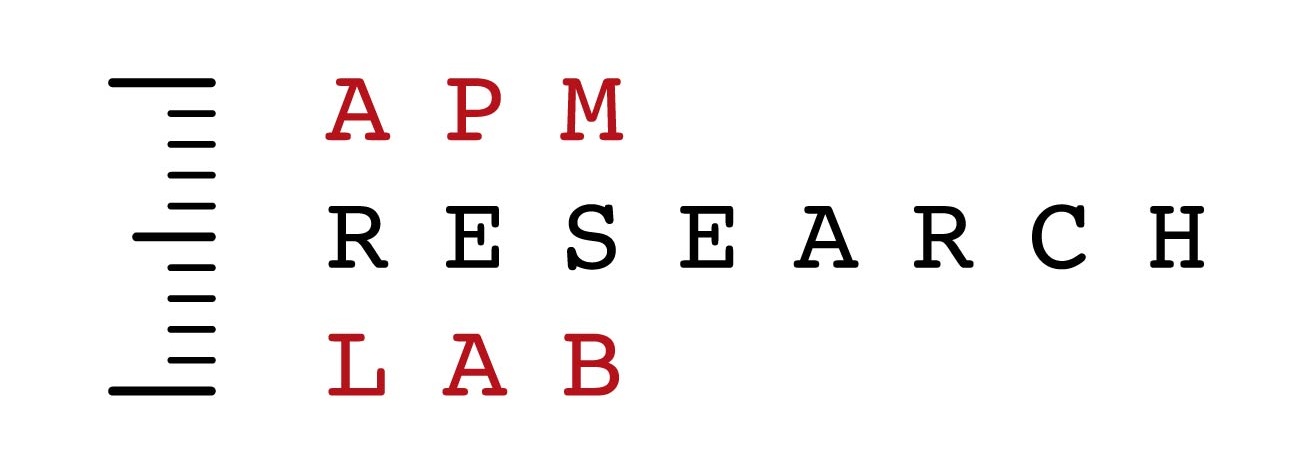by APM RESEARCH LAB STAFF | April 1, 2018
Given the rapid economic, demographic, and political changes that the state has been through in recent years, the APM Research Lab and MPR News wanted to better understand what is on the minds of Minnesotans—how they view their lives, their communities, their state, and the nation. We had some key questions and curiosities:
Are Minnesotans feeling anxious or optimistic about their home state?
How worried are they about their own personal economic circumstances?
What are the big divides among groups or geographies?
Might there be some surprising areas of consensus?
With the help of SSRS, a nationally-renowned survey research firm, we asked a representative sample of more than 1,650 Minnesotans—from the Twin Cities and throughout Greater Minnesota and major regional centers—what they think about everything from their own personal finances to the future of our state. Their responses, gathered during August and September 2017, provide insights on jobs, health care, immigration, politics, and much more.
In November 2017, MPR News, in collaboration with the APM Research Lab, launched the public Ground Level project with reporting and call-in shows. Throughout 2018, MPR News continued to report the stories behind the Ground Level survey from around the state, and hosted discussions on-air and on-line. The APM Research Lab provided detailed analysis of the survey results. Learn more about the findings and insights below.
Perspectives on Minnesota’s water resources
In the “Land of 10,000 Lakes,” Minnesotans give high marks to efforts to protect and steward its water resources. More residents said the state is on the “right track” regarding “providing safe drinking water” (85%) and “protecting lakes and rivers for things like swimming, boating, and fishing” (80%) than did so for all other issues appearing on the Ground Level survey.
Respondents were asked about nine public issues, including education, health care, and the economy, with the following question: “Thinking about the following topics, do you think Minnesota is generally on the right track or the wrong track when it comes to __?” Opinions on the two water resource questions varied somewhat based upon where Minnesotans live, as well as their educational attainment, income, and race. However, no meaningful differences existed by gender nor by political affiliation.
BRIEF for The Water Main | MPR NEWS: Views regarding the health and security of our water resources | LAB NOTES: Minnesotans: United on water, divided on immigration
TOPICAL REPORTS & BRIEFS
MINNESOTA’S WATER RESOURCES
MINNESOTA’S REGIONAL CENTERS
MINNESOTA’S THREE RURAL GROUPINGS: THE NORTHERN, CENTRAL, AND SOUTHERN REGIONS
RURAL-URBAN PERSPECTIVES
ONE THING MINNESOTANS WOULD CHANGE
POLITICAL APPROVAL RATINGS
HOPEFULNESS, FINANCIAL SECURITY, AND SENSE OF FINANCIAL IMPROVEMENT COMPARED TO 10 YEARS AG0
TRUST IN MINNESOTA INSTITUTIONS
IS MINNESOTA ON THE RIGHT TRACK?
COVERAGE
MPR News: Is Minnesota on the right track for clean water?
MPR News: On immigration issues, Minnesota shows deep divides
MPR News: Minnesotans love their health care, but not all is well
MPR News: What's 1 thing you want changed in Minnesota in 2018?
MPR News: Franken's Minnesota support dims amid sexual misconduct claims
MPR News: Two churches. One God. Different politics
MPR News: Here and elsewhere, people of faith lean Republican
MPR News: Most Minnesotans see state taxes as good value
LAB NOTES: United on water, divided on immigration
LAB NOTES: Just over half of Minnesotans report personal financial progress over the decade
LAB NOTES: Do more Minnesotans want lower taxes, or services that require taxes?
LAB NOTES: Five findings on hope (and fear)
Photo credits, left to right: St. Cloud photo by Elkman ; Lindstrom photo by J. Stephen Conn ; St. Paul photo by Matt Jones .
Geographic differences and common ground
DEFINITIONS
For purposes of the Ground Level project, urban residents are defined as those residing in any of the seven counties of Anoka, Carver, Dakota, Hennepin, Ramsey, Scott, and Washington. The greater Duluth, St. Cloud, and Rochester Areas are considered regional centers. Rural residents are those who live outside of the urban 7-county area and also outside of the regional centers.
COMMON GROUND
By their own assessment, rural and urban Minnesotans are equally likely to be feeling financially secure and insecure. About 16 percent of both rural and urban residents feel they are financially “worse off” than a decade prior, while just over half in both areas experienced what they perceive as economic progress.
Regardless of urban or rural locale, a similar share of Minnesotans (just above 6 in 10) trust organized religion and the public schools to do the right thing more often than not. And trust for police is high statewide—with 7 in 10 (or more) adults believing they do the right thing just about always or most of the time.
DIFFERENCES
In terms of welcoming immigrants and refugees, a minority of rural residents (42%) believe Minnesota is on the right track, compared to a strong majority (69%) of urbanites. This 27 percentage-point difference was the largest urban-rural gap across the survey.
News media suffers from lower levels of trust in rural Minnesota. Residents of Northern Minnesota express the lowest opinion of news media. Many Minnesotans are also distrustful when it comes to the state government. Central Minnesota residents are the most skeptical, with only 28 percent of residents saying they trust the state government to do what is right just about always or most of the time compared to roughly 40 percent of Minnesotans statewide.
For five of the institutions asked about on the survey, the Rochester Area emerged as having the greatest percentage of “high trust” residents among regional centers, while St. Cloud Area residents were either the lowest—or tied for the lowest—community expressing trust.
BRIEF: Duluth, St. Cloud, and Rochester Areas | BRIEF: Minnesota’s three rural groupings: Northern, Central, and Southern regions | BRIEF: Rural-urban perspectives | LAB NOTES: Just over half of Minnesotans report personal financial progress over the decade
Is Minnesota on the right track or wrong track on public issues?
The Ground Level survey included the question, “Thinking about the following topics, do you think Minnesota is generally on the right track or the wrong track when it comes to __?” Respondents were asked about nine public issues:
Educating children,
Having good health care,
Providing care for those facing mental health issues,
Providing safe drinking water,
Protecting lakes and rivers for things like swimming, boating, and fishing,
Welcoming immigrants and refugees,
Strengthening the economy,
Caring for older adults, and
Providing opportunities for everyone to get ahead, regardless of their background.
More Minnesotans said we are on the right track for providing safe drinking water (85%) and protecting lakes and rivers (80%) than did so for all other issues. Right track responses were lowest for the state’s stance providing care for those facing mental health issues (56%) and welcoming immigrants and refugees (57%).
LAB NOTES: Minnesotans: United on water, divided on immigration | WHITE PAPER: Is Minnesota on the right track? | MPR NEWS: On immigration issues, Minnesota shows deep divides | MPR NEWS: Minnesotans love their health care, but not all is well
The “one thing” Minnesotans would change about their state
The Ground Level survey included the question, “If there is one thing that you would like to see changed in Minnesota to improve our state, what would that be?” Respondents’ answers were recorded verbatim, but later grouped into themes. The most common recommendations had to do with improving the state’s politics—often related to changing which party is in power. That theme appeared in about a fifth of the responses, followed by taxes and social issues, both surfacing in just over a tenth of the responses. The next most common items on Minnesotans’ wish list were changes to infrastructure, education, health care, and the economy.
WHITE PAPER: One thing Minnesotans would change | LAB NOTES: Do more Minnesotans want lower taxes, or services that require taxes? | MPR NEWS: What's 1 thing you want changed in Minnesota in 2018?
Political approval ratings and opinions by political affiliation
The Ground Level Survey asked Minnesotans whether they approved or disapproved of the job performance of five political figures/bodies: U.S. Senator Klobuchar, U.S. Senator Franken, Governor Dayton, the MN State Legislature, and President Trump. At the time of the survey (Aug. 22-Sept. 14, 2017), Sen. Klobuchar enjoyed the highest overall approval rating (64%). Sen. Franken and Governor Dayton were statistically tied, with slightly more than half of Minnesotans (55-59%) approving of each. Just over 4 in 10 Minnesota adults approved of the MN State Legislature’s job performance. Only 36 percent of Minnesotans approved of President Trump’s job performance.
WHITE PAPER: Political approval ratings | MPR NEWS: Franken's Minnesota support dims amid sexual misconduct claims | MPR NEWS: Two churches. One God. Different politics | MPR NEWS: Here and elsewhere, people of faith lean Republican | MPR NEWS: Most Minnesotans see state taxes as good value
Trust in Minnesota institutions
Across the seven institutions asked about in the Ground Level Survey, Minnesotans indicated they hold the highest levels of trust in the police (76% said they trust police to do what is right just about always or most of the time) and the medical system (72% responding similarly). This was followed by organized religion and the public schools (63% apiece), with the lowest levels of trust accruing to news media (43%), big business (41%), and state government (40%). However, levels of trust vary by age, income, geography, political affiliation, and more.
WHITE PAPER: Trust in institutions | MPR NEWS: Minnesotans’ trust in police | MPR NEWS: Minnesotans’ trust in news media
Hope, financial security, and financial progress
The overwhelming majority of Minnesotans (82%) are hopeful about the state’s future. They feel less optimistic about their own personal finances. While only 14 percent indicate that they are not financially secure, another 41 percent signaled at least some level of unease by responding they are somewhat financially secure. And although the economy of the Minnesota as a whole has recovered nicely since the “Great Recession,” only half of the state’s residents indicated that their financial situation is now better than it was in 2007.
LAB NOTES: Just over half of Minnesotans report personal financial progress over the decade | LAB NOTES: Minnesotans are feeling hopeful. Mostly. | MPR NEWS: Minnesotans upbeat even as problems, politics swirl
WHITE PAPER: Hopefulness, financial security, and sense of financial improvement compared to 10 years ago
In their own words
Five questions in the Ground Level survey allowed for open-ended responses from Minnesotans. Their unfiltered thoughts help us hear the spectrum of opinions, often deeply held, about key issues facing our state and nation.
Read verbatim responses from Minnesotans about the one thing they would like to see changed; their views on whether Minnesota is on the “right track” regarding immigration, health care, and the economy; and reasons they approve or disapprove of President Trump.










